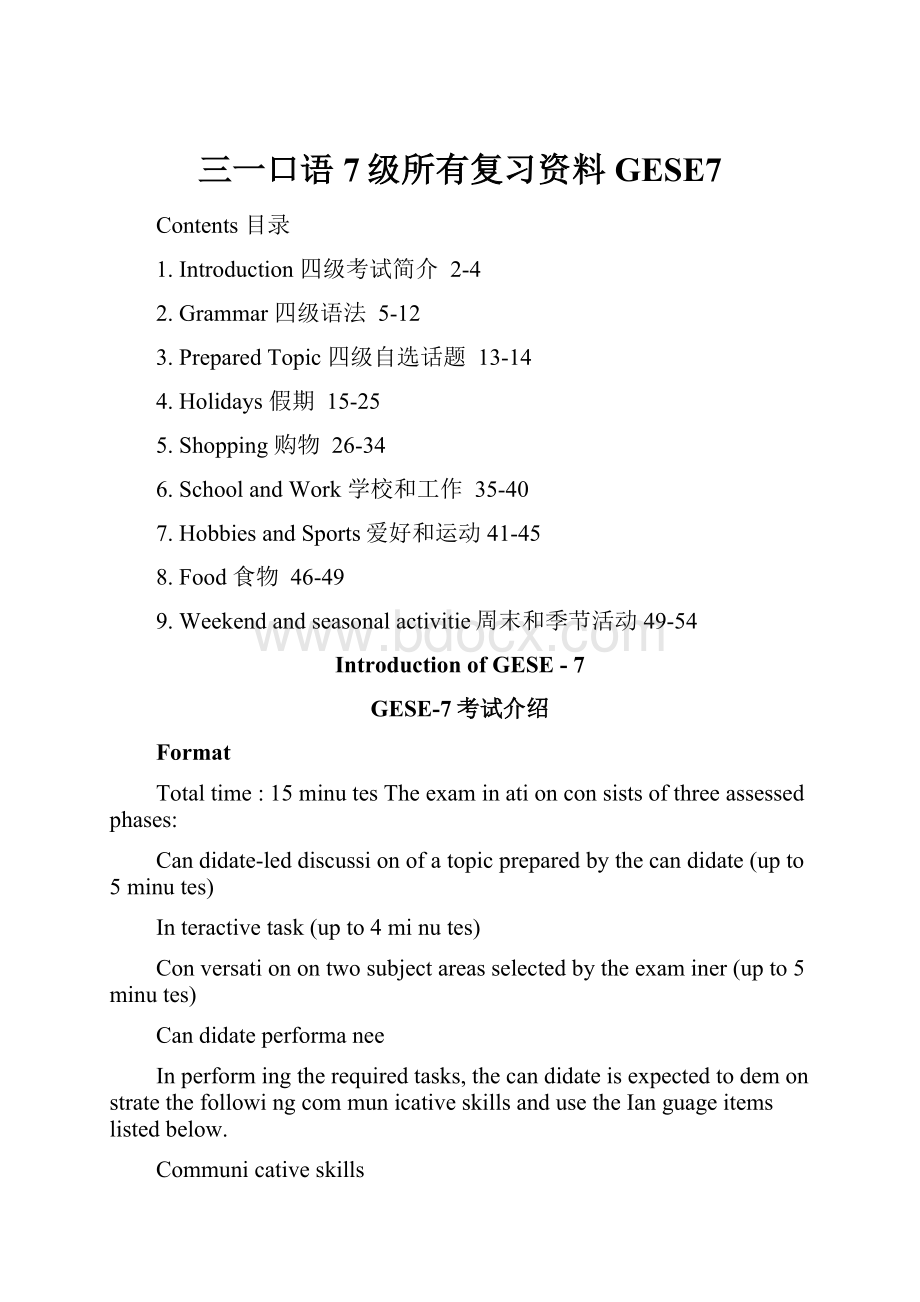三一口语7级所有复习资料GESE7.docx
《三一口语7级所有复习资料GESE7.docx》由会员分享,可在线阅读,更多相关《三一口语7级所有复习资料GESE7.docx(112页珍藏版)》请在冰豆网上搜索。

三一口语7级所有复习资料GESE7
Contents目录
1.Introduction四级考试简介2-4
2.Grammar四级语法5-12
3.PreparedTopic四级自选话题13-14
4.Holidays假期15-25
5.Shopping购物26-34
6.SchoolandWork学校和工作35-40
7.HobbiesandSports爱好和运动41-45
8.Food食物46-49
9.Weekendandseasonalactivitie周末和季节活动49-54
IntroductionofGESE-7
GESE-7考试介绍
Format
Totaltime:
15minutesTheexaminationconsistsofthreeassessedphases:
Candidate-leddiscussionofatopicpreparedbythecandidate(upto5minutes)
Interactivetask(upto4minutes)
Conversationontwosubjectareasselectedbytheexaminer(upto5minutes)
Candidateperformanee
Inperformingtherequiredtasks,thecandidateisexpectedtodemonstratethefollowingcommunicativeskillsandusetheIanguageitemslistedbelow.
Communicativeskills
IntheTopicphase
Showunderstandingbyrespondingappropriatelytotheexaminer
Communicateavarietyoffacts,ideasandopinions,andaccountforthese,aboutachosentopiclinkedacrossaseriesofextendedturns
Engagetheexaminerindiscussionofthetopic
Bepreparedtoaskandanswerquestionsaboutthecontentofthetopic
Handleinterruptionsorrequestsforclarificationthroughoutthediscussionofthetopic
IntheInteractivetaskphase互动交流
Initiatethediscourse主动弓丨导交流
Maintainthediscoursebyaskingforinformation不断提问获取更多信息,使交流持续进行
Helpthediscussionalongbyinvitingcommentfromtheexaminer请考官发表看法
Takeandgiveupturnswhenappropriatetodoso
Whereappropriatetotheindividualtask,makeuseofthefunctionslistedbelow
IntheConversationphase
10.Showunderstandingbyrespondingappropriatelytotheexaminer
11.Sharetheresponsibilityforthemaintenanceoftheinteractionwiththeexaminer
12.Incaseofabreakdownincommunication,showawarenessandtakebasicstepstoremedyit
Twosubjectareasfordiscussionwillbeselectedbytheexaminerfromthelistbelow:
Education教育
Nationalcustoms民族习俗
Villageandcitylife城市与乡村生活
Nationalandlocalproduceandproducts全国和地方性物产和产品
Earlymemories早期记忆
Pollutionandrecycling污染和再生利用
Functions
Givingadviceandhighlightingadvantagesanddisadvantages劝告,陈述优缺点和不利因素
Makingsuggestions建议
Describingpasthabits讲述过去的习惯
Expressingpossibilityanduncertainty表达可能性和不确定性
Elicitingfurtherinformationandexpansionofideasandopinions获取更多信息、扩展想法观点
Expressingagreementanddisagreement表达同意和不同意的意见
Languageproduction
Thecandidateisexpectedtodemonstratetheabilitytousetheitemslistedbelow,inadditionto
theitemslistedforthepreviousgrades.
Grammar
Secondconditional(第二条件句,即虚拟语气)
Simplepassive(简单的被动语态)
Usedto(过去常常做某事)
Relativeclauses(关系从句)
Modalsandphrasesusedtogiveadviceandmakesuggestionse.g.should/oughtto,could,you'dbetter
(表示劝告和建议的情态动词和短语)
Modalsandphrasesusedtoexpresspossibilityanduncertaintymay,might,I'mnotsure
(表示可能性和不确定性的情态动词和短语)
Discourseconnectorsbecauseof,dueto(连词词组)
Lexis
Vocabularyspecifictothetopicarea(和自选话题相关的词汇)
Vocabularyspecifictothesubjectareas(和对话话题相关的词汇)
Expressionsofagreementanddisagreement(表示同意、不同意的词汇)
Appropriatewordsandexpressionstoindicateinterestandshowawarenessofthespeaker,e.g.Really?
Ohdear!
Didyou?
(表示对对方的话内容感兴趣的用语)
Simplefillerstogivetimeforthought,e.g.Well…Um...(为赢得短瞬思考时间所用的简单用语)
Phonology
Thecorrectpronunciationofvocabularyspecifictothetopicandsubjectarea
Risingintonationtoindicateinterestandsurpriseasappropriate(正确运用升调以表示对事物的兴趣或
惊讶)
Fallingintonationtoindicatetheendofaturn(运用降调表示一段对话结束)
Intonationandfeaturesofconnectedspeechbeyondsentencelevel(用多个句子连续表达式正确运用语调、连续、重读等语音手段)
Examinerandcandidatelanguage
Thesampleexchangesbelowshowsomewaysinwhichexaminersandcandidatesmightexpressthemselvesduringtheconversation.Theseareonlyexamples,notmodelstobelearned.
Examiner
Candidate
Andwhatareyougoingtotalkabouttoday?
TodayI
dliketotellyouabout
Dolhpihnisn
sinceIwaseleven.
Afriendofminehasaskedmetolendhiman
Whydoeshewanttoborrowthismoney?
amountof
money.
IthinkI
velostsomethingveryimportant.
Ohdear!
Whatexactlyhaveyoulost?
Ifyouwereme,whatwouldyoudo?
I'dprobablygotothepolice.
I'mthinkingofmovingfromtheUKtoliveinWell,oneadvantageistheweatherbuttheGreece.
disadvantagesmightbe…
Whodoyouthinkshouldberesponsibleforrecycling?
Ithinkit'smainlythegovyernment'
butweshouldalltakepart.
IusedtohategreenvegetableswhenIwassmall.SodidI—butmymotherusedtomakemeeatthem.
Didyoulikefruit?
Tellmeaboutsomeofthemarriagecustomsinyourcountry.Well,theceremonyisusuallyheldinachurch
andthebrideisdressedallinwhite.
Doyouthinkyoumightgotouniversitywhenyoufinishschool?
I'mnotsure,thoughmybrotheriss
medicineandenjoyinguniversityalot.
AnexampleofapromptandthepossibledevelopmentoftheinteractionatGrade7isgivenbelow.
SampleexchangeintheInteractivephaseatGrade7
Examiner:
ThisisthefirsttimeI'veeverbeentothisareaandIhaveafreeweekend.
Candidate:
Whatareyouinterestedin?
Examiner:
Well,IlikevisitingmuseumsbutIdon'tlikenoisyorcrowdedplaces.
Candidate:
Oh,yes.Ifeelthesame.Therearethreeverygoodmuseumsinthetown.Doyoulikemodernart?
Examiner:
Notreally,Ipreferhistory.
Candidate:
Well,IthinkyoushoulddefinitelygototheArchaeologicalMuseum.It'sanold
castlewhichwasconvertedintoamuseumlastyear.TherearemanyRomanremainsinthispartofthecountryandthemuseumdisplaystheseverywell.
Examiner:
What'sagoodtimetogo?
Candidate:
ThebesttimetogoisprobablySundaymorning—it'susuallyquiteemptythen.
Examiner:
Right.Actually,IwenttoanarchaeologicalmuseuminEnglandnotlongago.
Candidate:
Didyou?
WhereinEnglandwasthat?
Examiner:
HaveyouheardofCambridge?
Candidate:
Yes,it'sveryfamous,isn'tit?
Wasthemuseumverygood?
Examiner:
Yes,they'vedonealotofworktothemuseumtomakethedisplaysmore
tso
interestingforvisitors—andthere'salsoawonderfulcafeteriathere
Unfortunately,there'snowheretoeatordrinkinsidethemuseumshere.Itisncountry
TheGrammaofGESE-7
GESE-7语法重点
1.if引导的非真实条件句
虚拟语气可以表示过去,现在和将来的情况,时态的基本特点是时态往后推移。
条件从句
主句
一般过去时(be用
should(would)等+动词原形
were)
a.与现在事实相反的假设
例如:
Iftheywerehere,
theywouldhelpyou.如果他们在
这儿,会帮助你的。
含义:
Theyarenothere,theycan
thelpyou.
1.IfIwonthatmuchmoney,Iwouldtravelaroundtheworld.
2.IfIwereyou,Iwouldspenditonaholiday.
3.IfIwerebetter,Iwouldplaywithmyfriend.
4.IfIknewtheanswer,Iwouldpasstheexam.
5.IfIdidn'thavesomuchwork,Iwouldgohome.
6.IfIhadmoremoney,Iwouldbuyacar.
7.Ifheweretaller,hecouldplaybasketballbetter.
8.IfIsuddenlybecamerich,I'dfeelwonderful.
9.IfIhadalotofmoney,IwouldgotoEnglandonholiday.
2.wish的用法
wish后面的从句,表示与事实相反的情况,或表示将来不太可能实现的愿望。
其宾语从句的动词形式为:
主句
从句
从句动作先于主句动词动作
(be的过去式为were)
现在时
过去时
IwishIwereastallasyou.我希望和你一样高
IwishIlivedintheUSA.
IwishIhadthatmuchmoney.
IwishIhadasister.
3.情态动词的使用
hadbetter表示"最好”,相当于一个助动词,它只有一种形式,它后面要跟动词原形。
例如:
Itisprettycold.You'dbetterputonmycoat.天相当冷。
你最好穿上我的外套。
She'dbetternotplaywiththedog.她最好不要玩耍那条狗。
wouldrather表示”宁愿”
wouldratherdo
wouldrathernotdo
wouldrather…tha宁愿•…而不愿。
Iwouldratherstayherethangohome.=Iwouldstayhereratherthangohome.
我宁愿呆在这儿,而不愿回家。
should和oughtto
shoulddosth.oughttodosth.
shouldn'tdosth.oughtnsth.'ttodo
shouldhavedonesth.oughttohavedonesth.
shouldn'thavedonesth.oughttohavedonesth.
1)表示"想必一定,按理应该"的意思,oughtto在语气上比should要强。
例如:
Ioughttobeabletoliveonmysalary.靠我的薪水,想必也能维持了。
Itoughttobereadynow.想必现在准备好了吧。
Theyshouldbetherebynow,Ithink.现在他们该到那儿了。
Thepoemsshouldbeoutinamonthatmost.诗集估计最多还有一个月就要出版了。
2)oughttohavedonesth,shouldhavedonesth表示本应该做某事,而事实上并没有做。
否定句表示"不
该做某事而做了"。
例如:
Yououghtto(should)havebeenmorecarefulinthisexperiment.你当时在做试验时应该更仔细点。
Heoughtnottohavethrowntheoldclothesaway.他不该把旧衣服扔了。
(事实上已扔了。
)
表示推测的用法mustbe
musthavedone
must表示推测
1)must用在肯定句中表示较有把握的推测,意为"一定"。
2)must表对现在的状态或现在正发生的事情的推测时,must后面通常接系动词be的原形或行为动词的进行式,即mustbe/mustbedoing。
例如:
Youhaveworkedhardallday.Youmustbetired.你辛苦干一整天,一定累了。
(对现在情况的推测判断)
Hemustbeworkinginhisoffice.他一定在办公室工作呢。
Atthismoment,ourteachermustbecorrectingourexampapers.
比较:
Hemustbestayingthere.他现在肯定在那里。
Hemuststaythere.他必须呆在那。
3)must表示对已发生的事情的推测时,must要接完成式,即musthavebeen/donesth.,语气较强,具有"肯定","谅必"的意思。
例如:
Ididn'thearthephone.Imusthavebeenasleep.我刚才没有听到电话,我想必是睡着了。
Theroadiswet.Itmusthaverainedlastnight.
Lindahasgonetowork,butherbicycleisstillhere.
Shemusthavegonebybus.
否定推测用can't,can'tbe
can'thavedone/beensth.
例如:
IfTomdidn'tleavehereuntilfiveo'clock,hecan'tbehomeyet.如果汤姆五点才离开这儿,他此时一定还未到家。
Mikecan'thavefoundhiscar,forhecametoworkbybusthismorning.
may,might,对可能性进行推测,其用法如下:
maydosthmightdosth.
mayhavedonesth.mighthavedone.sth.
1)情态动词+动词原形,表示对现在或将来的情况的推测,此时动词通常为系动词。
例如:
Idon'tknowwheresheis,shemaybeinWuhan.我不知道她在哪儿,可能在武汉。
Hemightbeathome.
2)may(might)have+donesth,can(could)have+donesth表示过去,推测过去时间里可能
9/100
发生的事情。
例如:
Philipmay(might)havebeenhurtseriouslyinthecaraccident.
菲力浦可能在车祸中受了重伤。
Philipcan(could)havebeenhurtseriouslyinthecaraccid